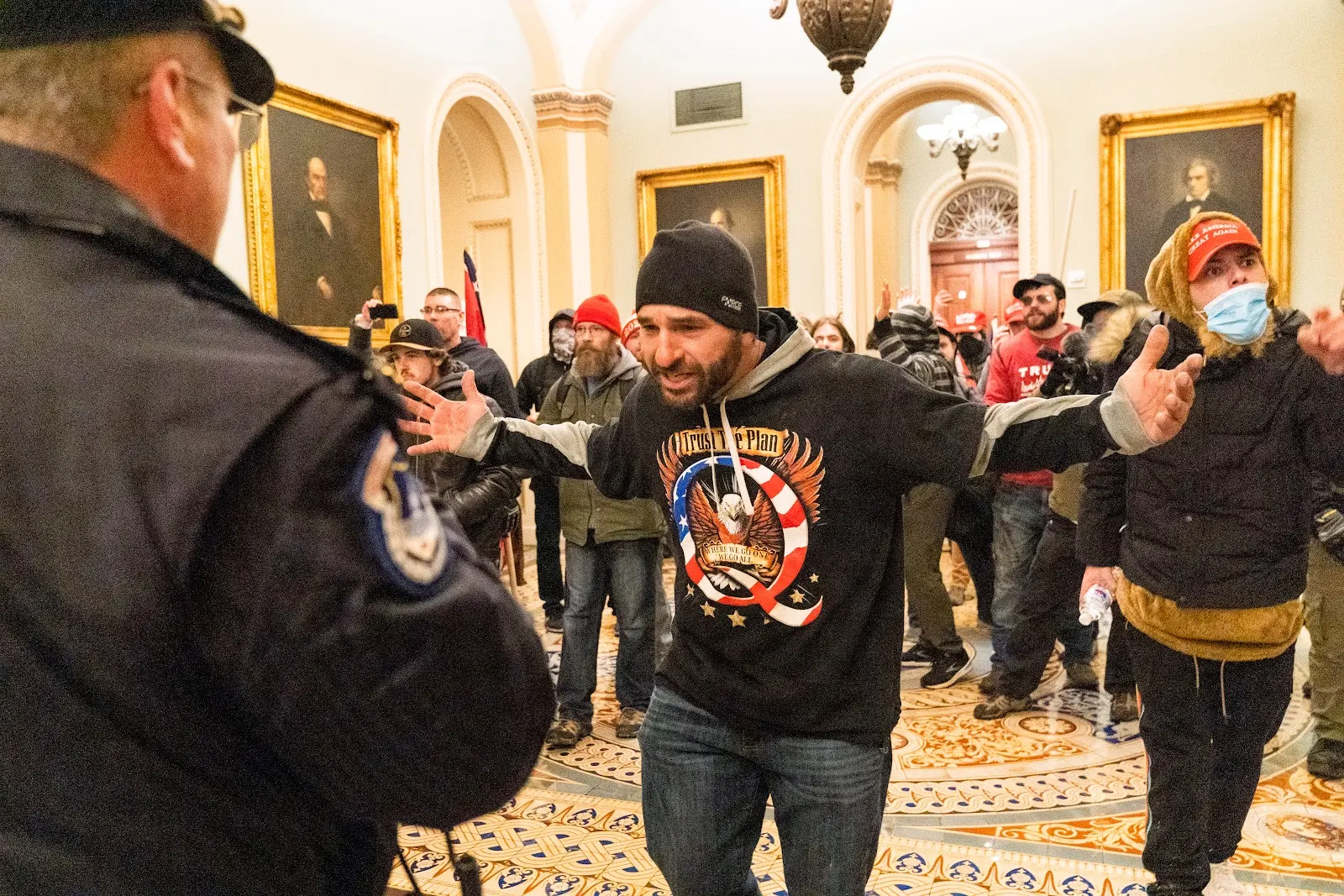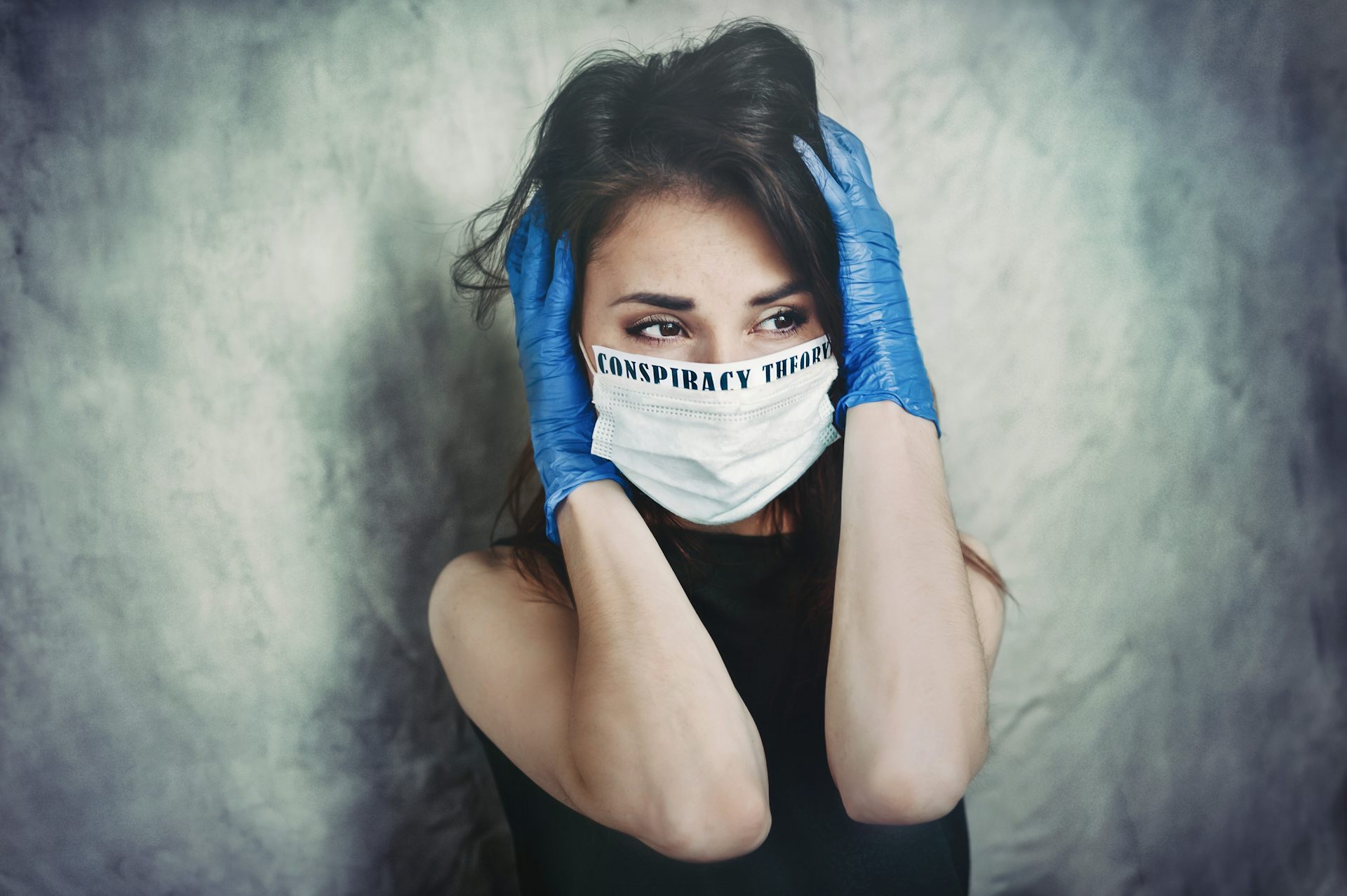
A supporter of President Donald Trump, seen wearing a QAnon shirt, is confronted by Capitol Police officers outside the Senate Chamber during the invasion of the U.S. Capitol
Credit: AP Photo/Manuel Balce Ceneta
As it became more and more apparent just how badly Trump lost, being the only presidential candidate in American political history to lose the popular vote twice and that Joe Biden had won it by a record margin, so the conspiracy theories became more and more lurid.
So why do some credulous fools fall for these unlikely theories, usually involving vast secret conspiracies such as the entire scientific community together with all their technical and administrative staff and everyone involved in publishing scientific books, periodicals and papers, or senior military leaders and heads of government of even hostile states, together with their advisors and civil service?
In the following article, reprinted from The Conversation under a Creative Commons license, Daniel Jolley, Assistant Professor in Social Psychology, University of Nottingham, UK and Anthony, Lantian, Associate Professor in Psychology, Université Paris Nanterre – Université Paris Lumières, France, explain the psychology and the social causes of this gullibility and readiness to believe the patently absurd. The article, the original of which can be read here, is reformatted for stylistic consistence.

Bullying, power and control: why people believe in conspiracy theories and how to respond

Belief in conspiracy theories is often linked to lack of trust in institutions.
Credit: Marko Aliaksandr/Shutterstock
From vaccine uptake to violent extremism, conspiracy beliefs are linked to distrust in major institutions or powerful figures.
Research developed in the last decade shows how conspiracy beliefs can be linked to people’s lack of control in their lives, feeling threatened or even workplace bullying.
Conspiracy theories are defined by psychologists as “explanations for important events that involve secret plots by powerful and malevolent groups” without any basis in fact. Followers point a finger at groups they think of as powerful, from scientists and doctors to minority groups such as Jewish people, and blame them for events or societal change.
Conspiracies, where powerful figures secretly plot to undermine something or someone, do exist. The Watergate scandal involved a break in at the US Democratic National Committee headquarters by burglars connected to President Richard Nixon’s reelection campaign.
The burglars were caught wiretapping phones. Nixon tried to cover up the crimes but journalists uncovered his role in the conspiracy. But the difference here is that there is evidence to back up what happened.
However, conspiracists insist their theories are true even when there is no evidence that holds up to scrutiny. Still, conspiracy theories can be persuasive. Millions of British people believe in at least one. It’s a worldwide phenomenon.
Psychology of conspiracy theories
Studies in the early 2010s showed how non-pathological factors, such as uncertainty, are linked to why people turn to conspiracy beliefs. In 2017 psychologist Karen Douglas and colleagues argued the wide appeal of conspiracy theories is their promise to satisfy psychological needs. These include desire for certainty, control and meaning, and to maintain a positive image of yourself and the groups you identify with.

But conspiracy theories do not satisfy the psychological needs that make us reach for them. A 2021 study found conspiracy beliefs don’t lessen anxiety or uncertainty. If anything, there is some evidence people’s sense of existential threat and anxiety increases when they engage with conspiracy theories.
A less well understood factor is collective discrimination, where a group experiences being harmed by another group.
But researchers are getting closer to finding out why conspiracy theories are adopted by a group of people. It can be linked to lack of trust in institutions or society. Work in 2002 showed discrimination experienced by African Americans was associated with their heightened beliefs that HIV is made by humans deliberately. This idea still circulates today.
Research in 2020 found discrimination experienced by gay men in the UK was connected to their conspiracy beliefs about HIV being human-made. Such research underscores the links between conspiracy beliefs and distrust in powerful figures found in minority communities.
In a study into how conspiracy beliefs develop, Greek participants who thought their country historically suffered more than other nations were more likely to be conspiracy theorists. Research with similar study designs have found the same results in French and Polish participants.
Linked to bullying
Our recent research was inspired by previous work linking conspiracy theorising and people’s sense they are being victimised. We focused on workplace bullying. Unlike collective discrimination, bullying is personal, with a power imbalance between the bully and the victim.
Bullied victims report increased feelings of anxiety and paranoia. Being bullied seems to increase the risk of believing in a conspiracy theory.
We carried out two studies. The first study recruited 273 British participants online. We measured participants’ past experiences of workplace bullying by asking them report whether they experienced a range of incidents, such a colleague withholding information which affects a co-workers’ performance. The more negative acts a participant has suffered, the stronger their tendency to engage in conspiracy theorising.
Participants who experienced workplace bullying were more likely to report increased paranoia – to wonder what hidden reason another person may have for doing something nice for them.
In the second study, 206 British participants were asked to imagine they had joined a new work place in the last six months. Half were asked to imagine being bullied in the new workplace (for example being shouted at) or being welcomed. Those who were asked to imagine about being bullied reported an increased general belief in conspiracy theories.
Tackling conspiracy beliefs
Our work highlights how conspiracy beliefs can form in response to circumstances that could happen to anyone. When a hostile environment primes us to search for meaning, we may find a conspiracy explanation appealing.
Research has also started to find solutions to the problem. In 2018 one study found giving people a greater feeling of power reduced the intensity of conspiracy beliefs. Encouraging people to think analytically, which prompts deliberate processing of information, also helps curb the emergence of conspiracy beliefs. Developing these skills in adolescents and conspiracy believers is essential.
Challenging people’s misconceptions about how popular conspiracies are could be effective. For example, one study found giving information to UK parents with anti-vaccine beliefs about other UK parents who did vaccinate their children reduced conspiracy beliefs.
We do not know what tools will work outside of the lab. Mentorship for bullying victims, which has been shown to help people feel more secure, could be a promising place to start. And considering the devastation conspiracy theories can wreak, we can’t afford not to try.
Daniel Jolley, Assistant Professor in Social Psychology, University of Nottingham and Anthony Lantian, Associate Professor in Psychology, Université Paris Nanterre – Université Paris Lumières
AbstractThe QAnon conspiracy theories tend to make their biggest penetration in the American white Christian middle class, who feel threatened by the social progress of black people, assuming that granting other people the same rights and privileges in society that they enjoy, somehow reduces their privileged position. It's not the rights themselves that they enjoy but the thought that they are privileged and deservedly so, because America was created for white Christians.
Abstract. Experiences of bullying in the workplace can increase anxiety, paranoia, and hypervigilance to threat in victims. Such factors are also associated with conspiracy beliefs. Two preregistered studies (cross-sectional and experimental) tested whether bullying experiences may be linked to the development of conspiracy beliefs. Study 1 (n = 273) demonstrated that experiences of workplace bullying were positively associated with conspiracy beliefs, an effect that could be explained by paranoia. In Study 2 (n = 206), participants who imagined being bullied (vs. supported) reported increased belief in conspiracy theories. Our research uncovers another antecedent of conspiracy beliefs: workplace bullying. Future research should endeavor to explore how best to support victims and avert the link between being bullied and conspiracy theorizing emerging.
Jolley, Daniel; Lantian, Anthony
Bullying and Conspiracy Theories
Social Psychology(2022); 53(4), pp 198-208; DOI: 10.1027/1864-9335/a000492
© 2022 Hogrefe Publishing.
Reprinted under the terms of s60 of the Copyright, Designs and Patents Act 1988.
The same group feel threatened by the social progress of the LGBTQ community, for some reason imagining that granting equal rights to marriage for same-sex couples somehow undermines or lessens the status of their heterosexual marriage as ordained by God, which of course brings the wrath of God on them for failing to prevent it.
The assumption is that, because America is not the way they believe God created it, there must be something, or someone working to destroy it - the enemy, foreign or domestic, trying to take Americans' freedoms away ever since 1776. This is the racist, white supremacist paranoia that Trump appealed to and which his supporters in the QAnon cult and the white evangelical churches are seeking to exploit still. One wonders if they have found their target marks' lowest level of credulity yet.


No comments:
Post a Comment
Obscene, threatening or obnoxious messages, preaching, abuse and spam will be removed, as will anything by known Internet trolls and stalkers, by known sock-puppet accounts and anything not connected with the post,
A claim made without evidence can be dismissed without evidence. Remember: your opinion is not an established fact unless corroborated.